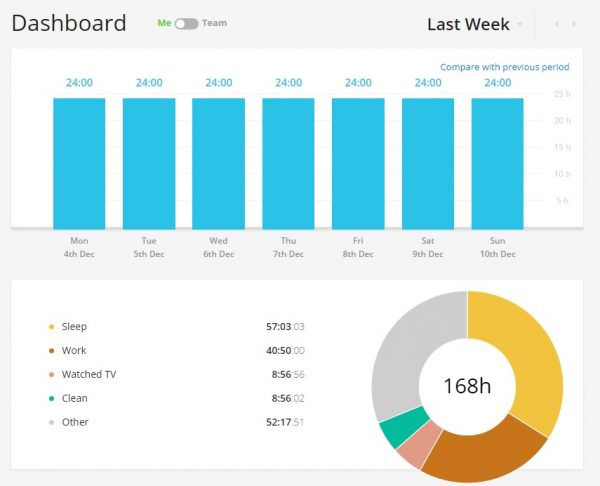Laura Vanderkam and Toggl Changed my Life
- Chickster

- Dec 16, 2017
- 3 min read
By Kelly

I first learned about best-selling author and time management expert Laura Vanderkam through a Texas Conference for Women podcast.
Then I read her website, several of her articles and four of her books within a month. (I recommend 168 Hours, What the Most Successful People Do Before Breakfast and I Know How She Does It.)
Toggl
I even started tracking my time with her spreadsheet, but found it too manual so use Toggl instead, since she mentioned the time management app in a 2016 interview with The New York Times. (I definitely recommend Toggl in lieu of an Excel spreadsheet. It automates the whole process.)

168 hours
You should read 168 Hours to grasp her full approach, but it’s basically this: There aren’t enough hours in a day (24) to do everything you want, but there are enough hours in a week (168). If you sleep 8 hours a night (56 hours a week) then you have 112 waking hours and, hopefully less than half of that goes to earning a living.
If you’re like me, you work 40 hours a week, but it actually takes 50 hours when you add commuting and required, yet unpaid, lunch breaks. (When the heck did this start anyway? The cliché is 9 to 5—exactly 8 hours—not 8 to 5 or 9 to 6. This means that lunch breaks were, at some point paid, and they should’ve stayed that way, especially if your employer requires them.)
When you subtract your workweek hours from 112, you should have a good chunk of time left each week to get everything done. For me it’s 62 hours. I can do a lot with 62 hours a week.
Workday challenges
My weekends are pretty wide-open and wonderful, but my workdays are a little more challenging. I get home by 5 p.m. and then have five hours before I need to go to bed (to get 8 hours of sleep) to get everything non-work-related about my daily life done. Once I’ve fed and walked my dog, cooked something (I don’t enjoy cooking. I mostly buy and heat fast and frozen food.), it’s 7 p.m. with 3 hours until bedtime. It’s hard to fill that time with anything but watching TV. (I used to try and workout in the evenings, but thanks to Laura’s persuasive arguments about mornings in What the Most Successful People Do Before Breakfast, I get my workouts done before work, daily. After work I’d be lucky to get in two workouts a week with the whack-a-mole of evenings: like unexpected, soul-crushing traffic, a late meeting or a spontaneous happy hour. As Laura points out, these things don’t tend to come up at 6 a.m.)
That’s where time tracking comes in. Seeing 20 to 30 hours a week devoted to TV is pretty motivating. Currently, I’m still too tired after a 10-hour workday to do much with my evenings, but at least I’m always reading a book while I watch TV now. That’s something.
I want to find a way to write daily, but since I write for my day job, too, I get a little burned out on it. (Sometimes I write during lunch, but it’s hard to get anywhere in an hour.)
Weekend challenges
Again weekends are better. I can devote hours to writing on Saturday and Sunday mornings and often do. But, of course, things come up on the weekends, too, like quality time with the spouse, dog stuff, friend and family stuff, fun events, errands/chores and my favorite workout classes—discovered when I was into weekend-only workouts.
Finding balance
You’re not always going to spend your time perfectly, but knowing exactly where your time goes helps you spend it more intentionally (since you feel more accountable). Ever since I’ve started tracking my time, I’ve felt smarter, happier and more awake on workdays (since I workout in the morning), I only have to shower once a day, I’ve gotten more done at work and at home, and I haven’t spent any of my precious time staring at my smartphone. (This is solely because I don’t want to add “smartphone staring” as a project to my Toggl, but still.)
I wish you similar success.
Happy Toggling!



Comments